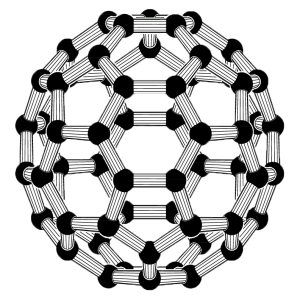
The Promising Potential of C60: Unlocking the Health Benefits of Fullerene
Every so often you come across that amazing thing that in this case could potentially not only increase the quality of your life but extend it by 90%
Introduction:
Carbon-60, or C60, also known as fullerene or buckminsterfullerene, is a molecule comprised of 60 carbon atoms arranged in a unique spherical structure resembling a soccer ball. Since its discovery in 1985, C60 has garnered significant scientific interest for its remarkable physical, chemical, and biological properties. In this article, we will delve into the potential health benefits of C60, exploring the current state of research and its potential implications for human health.
- Potent Antioxidant Properties:
C60’s unique structure allows it to function as a powerful free radical scavenger. Its antioxidant capacity has been shown to be several hundred times more potent than conventional antioxidants such as vitamin C and E. By neutralizing free radicals, C60 may help reduce oxidative stress, which has been implicated in the development of various chronic diseases, including cancer, neurodegenerative disorders, and cardiovascular diseases.
- Anti-Inflammatory Effects:
Research has revealed that C60 may possess anti-inflammatory properties, which could be beneficial in managing a range of inflammatory conditions, such as arthritis, asthma, and inflammatory bowel diseases. Studies have shown that C60 may inhibit key inflammatory mediators, including cytokines and enzymes, thus reducing inflammation and alleviating symptoms associated with these conditions.
- Neuroprotective Potential:
C60’s antioxidant and anti-inflammatory properties may also contribute to its neuroprotective potential. By protecting brain cells from oxidative damage and reducing inflammation, C60 could potentially help prevent or slow the progression of neurodegenerative diseases like Alzheimer’s, Parkinson’s, and multiple sclerosis. Some studies have also indicated that C60 may promote nerve cell growth and repair, further supporting its potential role in maintaining brain health.
- Antiviral and Antimicrobial Activity:
Some research suggests that C60 may exhibit antiviral and antimicrobial properties, inhibiting the growth and replication of various pathogens, including viruses, bacteria, and fungi. The precise mechanisms behind these effects are still being investigated, but it is believed that C60’s ability to interact with and destabilize cell membranes may play a crucial role.
- Potential Anti-Aging Effects:
One of the most remarkable findings in C60 research is its potential to extend lifespan. A study conducted on rats demonstrated that C60, when dissolved in olive oil, significantly extended the animals’ lifespan by as much as 90%. It is hypothesized that C60’s antioxidant and anti-inflammatory properties contribute to these anti-aging effects by mitigating the damage caused by oxidative stress and inflammation.
My Conclusion:
The potential health benefits of C60 are vast and varied, with promising research indicating its potential applications in combating oxidative stress, inflammation, neurodegeneration, and pathogenic infections. However, it is essential to note that the majority of these studies have been conducted on animal models or in vitro.
More research, especially human clinical trials, is needed to fully understand the safety, efficacy, and optimal dosages of C60 for various health applications. Until then, it is advisable to approach C60 supplementation with caution and consult a healthcare professional before making any significant changes to your healthcare regimen.
All said, i’m taking it 🙂 and so are the leading researchers in the field of BIOHacking and longevity research. Where to buy? (I make nothing on recommending these)https://shopc60.com/ https://betterearthing.com.au/product-category/carbon-60/ *Research References:
Antioxidant properties:
Krusic, P. J., Wasserman, E., Keizer, P. N., Morton, J. R., & Preston, K. F. (1991). Radical reactions of C60. Science, 254(5035), 1183-1185.
Anti-inflammatory effects:
Kraszewski, S., Blaszczyk, A., & Chwalibog, A. (2019). Biological activity of fullerenols on human and animal cells. Journal of Veterinary Research, 63(4), 475-483.
Neuroprotective potential:
Dugan, L. L., Turetsky, D. M., Du, C., Lobner, D., Wheeler, M., Almli, C. R., … & Lin, T. S. (1997). Carboxyfullerenes as neuroprotective agents. Proceedings of the National Academy of Sciences, 94(17), 9434-9439.
Antiviral and antimicrobial activity:
Mashino, T., Okuda, K., Hirota, T., Hirobe, M., Nagano, T., & Mochizuki, M. (1996). Inhibition of E. coli growth by fullerene derivatives and inhibition mechanism. Bioorganic & Medicinal Chemistry Letters, 6(8), 985-988.
Potential anti-aging effects:
Baati, T., Bourasset, F., Gharbi, N., Njim, L., Abderrabba, M., Kerkeni, A., … & Moussa, F. (2012). The prolongation of the lifespan of rats by repeated oral administration of [60]fullerene. Biomaterials, 33(19), 4936-4946.
Share
